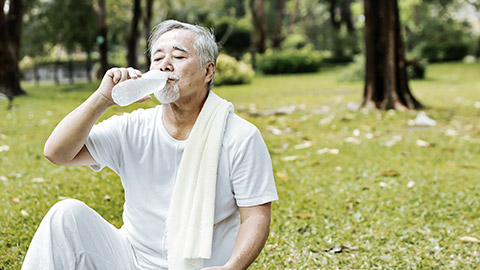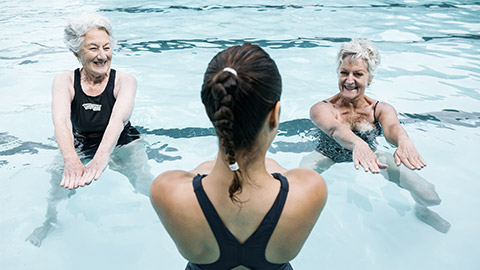Good health is not just about our physical condition. The basic requirements for a person in good health include:
- good nutrition
- adequate fluids
- good hygiene
- exercise
- an enjoyable lifestyle
Nutrition

A good diet is one of the most important factors contributing to good health and quality of life. Food and mealtimes are also crucial to our social and cultural routines. Malnutrition increases the risk of pressure sores, falls and fractures. It shortens the person’s life expectancy and leaves them with a lower quality of life.
Fibre
Fibre is important to help reduce constipation, which can be a significant problem for older people and people with physical disabilities. Vegetables, grains, and fruits are all excellent sources of fibre. Prunes, liquorice, and fibre supplements stirred into a drink are great ways to boost fibre.
Protein
Protein builds muscle strength, reduces the chance of falls, and helps the person to stay active. It also plays a part in wound healing and restoring damaged cells. Meat, chicken, fish, eggs, cheese, milk, custard, and beans are good protein sources.
Calcium
Calcium is needed for bone strength. Full-cream dairy options contain more calcium than low-fat. They include milk, yogurt, and cheese. Vitamin D works with calcium to increase bone strength. We get most of our Vitamin D from the sun, but it is also in foods such as fish, margarines and milk products.
Case Study
Kiri supports Ngaio, a frail lady who lives in her own home. Kiri is concerned that Ngaio has recently lost weight, which could impact her physical wellbeing. Ngaio has a small appetite, but does like eating finger foods and custards. Ngaio wears a full set of dentures but is sometimes reluctant to put them in. Kiri talks to her manager about some options for helping Ngaio to increase her appetite.
Together with Ngaio and her husband, they work out some strategies, that will be added to Ngaio's personal plan.
Take a moment to reflect on what actions you could take to improve Ngaio's appetite. Write a list and then click on the heading below to check your ideas against ours.
- Help Ngaio stimulate her appetite by supporting her to walk a short distance before meals.
- Offer Ngaio small meals more frequently, focusing on the foods she likes.
- Provide assistance to eat if needed.
- Reheat food regularly if it has gone cold.
- Ngaio’s husband will help organise a visit to the dentist to ensure that Ngaio’s dentures fit well.
Hydration

A healthy person drinks at least 2 litres (6-8 cups) of water or other liquids per day. Hydration helps regulate body temperature, prevents infections, and keeps our organs functioning properly.
Other benefits of staying hydrated include:
- relieving fatigue
- flushing toxins out of the body
- improving skin tone
- maintaining bowel regularity
Dehydration happens when more fluid is lost than is taken in. This means the body doesn’t have enough fluid to perform proper functions, which can cause serious health effects.
Symptoms of dehydration can include:
- sunken eyes
- confusion
- headache
- dry mouth and tongue
- dark, concentrated urine
- tiredness
- dry skin
- constipation
Some reasons for dehydration can include:
- swallowing difficulties
- diarrhoea or vomiting
- sweating in hot weather
- not being able to see, reach for or ask for a drink, and not getting enough help to drink regularly
- medicines that make the person pass more urine
- forgetting to drink, such as when the person has dementia
- deliberately not drinking to try and avoid trips to the toilet
Exercise

Exercise helps nearly every part of the human body (and mind) to function better. Exercise can:
- Help the person to maintain a healthy weight and reduce fat around the body’s organs.
- Reduce high blood pressure.
- Pump blood more effectively around the body and into the tissues, providing energy to our cells and brain.
- Work muscles and other structures to keep them strong, supple and efficient and to reduce the chance of falls.
- Strengthen bone and reduce osteoporosis and fractures.
- Help lift mood.
- Provide the person with a purpose and an enjoyable pastime.
- Increase the person’s lung function and support breathing.
- Increase appetite.
Exercise does not have to mean high-impact or energetic workouts. If the person has a physical disability, an illness, or if they are frail, you can help them tailor exercise to suit their needs and abilities.
Watch: Exercise classes for disabled people – disabled fitness instructor Kris’s story (2.26)
Watch the following video to learn more about exercise for wheelchair-bound people.
Reflection
Can you think of some types of exercises or games that could help the kind of people you support?
No one expects you to understand the full range of diseases or conditions that might affect the people you support. However, it is important that you can look for and report changes in health and wellbeing. Such changes might indicate that the person is unwell or needs additional support or referral to another health provider.
Signs that a person might be experiencing illness or that they are at risk of poor health include:
- pain or discomfort, especially if it is ongoing
- sudden signs of confusion
- a high temperature or feeling hot and sweaty for no good reason
- nausea and vomiting
- dizziness or weakness
- rashes, redness or other skin problems
- pale or flushed skin
- changes in the person’s physical abilities
- withdrawal or depression
Your organisation will have a system for reporting these and other signs of illness. If you have concerns, report them immediately because some signs and symptoms can indicate a serious health problem.
You will also need to document the person’s signs and symptoms carefully. Documentation helps to support your verbal report and can help to ensure that the information is passed on correctly to others, such as health professionals.
Activity
Self-awareness and self-reflection
You have already covered self-awareness and self-reflection earlier in this course. This serves as a reminder of the basics.
- Self-awareness begins with self-reflection.
- Self-reflection is about questioning positively what you do, and why you do it and deciding if there is a better or more efficient way of doing it in the future.
- It can be challenging, but you need to remain objective and honest when analysing your behaviour.
- Self-awareness means understanding how you think and behave. It also includes honestly describing what skills you have and what skills you are missing.
-
Identify the self-reflection questions you want to ask yourself. Ask yourself ‘how’ questions rather than ‘why’ questions.
Watch: Examples of Reflective Practice (2.51)
Watch the following video, which provides examples of reflection in healthcare.
Reflection on your journey
Now that you've explored what it takes to become a community support worker, it's time for some self-reflection. Reflecting on your personal goals and aspirations is essential to your journey.
Activity
This exercise will help you connect with your motivations and set a clear path forward.
Remember, your path to becoming a Community Support Worker is a unique and personal journey. By reflecting on your aspirations and taking proactive steps towards your goals, you're well on your way to making a positive impact on the lives of others.
